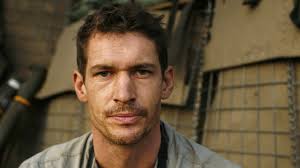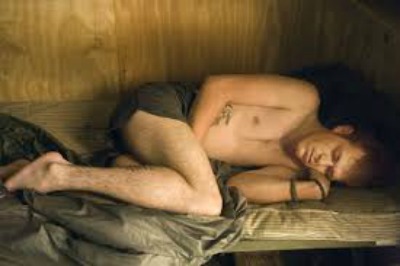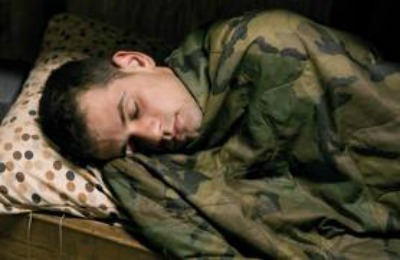I’ve just finished watching a must-see Documentary
Famed war correspondent and filmmaker, Sebastian Junger (War, The Perfect Storm, Restrepo) has made a documentary about a late-friend and colleague called, Which Way Is The Front Line From Here: the Life and Time of Tim Hetherington.
Hetherington was a war photo-journalist killed by mortar fire in a conflict in Misrata, Libya on April 20th, 2011 during the uprising against Moammar Gadhafi.

I was profoundly affected by this news because of a job I had for Fox/Lifetime TV in 2008.
I was hired to write a film tentatively titled Girls of the Green Zone, a true-life story about the friendship between first-time female war correspondent Christina Asquith and an Iraqi Green Zone interpreter turned Iraqi Media Network field reporter, Gia (her name is changed to protect her identity).
Both women met in the Green Zone during the first year of the Iraq War.
I spent six days in D.C. interviewing Chris, Gia and Chris’s now-husband Jack Fairweather (then correspondent for London’s Daily Telegraph) and was both horrified and electrified to be privy to their stories.
They’d all been hard targets for assassination by the Mujahideen, Gia once being chased by a masked follower of Muqtad? al-?adr who tried to behead her with a machete.
She was rescued by American PMCs just outside the Green Zone.
All three of these journalists had lost loved ones and friends to the jihadists, suicide bombers and IEDs.
Hearing their stories, some told for the very first time, gave me a treasured intimacy with them that could never be reciprocal because I didn’t have those kinds of stories to tell.
I’d never been to war.
(Sadly Girls of the Green Zone was derailed by the 2008 Writer’s Guild Strike)
Watching Which Way, Junger’s documentary about Hetherington, brought me right back to those interviews in D.C. — the rarefied world of brave, extraordinary people who do the dangerous things that need to be done — and I was so sorry to hear that the community Chris and Gia belong to had lost one of its own.
What makes Junger’s documentary so exceptional is that Hetherington is one of its narrators.
He’s a handsome man with an easy, friendly manner, an infectious laugh and a deep abiding sense of responsibility toward his subjects.
After reporting on the civil war in Liberia — his first war zone — he stayed on and lived there and in other struggling countries in East Africa for eight years as, not just a journalist, but also a mentor, teacher and humanitarian.
I find most moving Hetherington’s portraits of sleeping soldiers that were taken when he and Junger embedded with American troops at an outpost called Restrepo in the horrifically dangerous Korengal Valley in Afghanistan circa 2008.
(Their ensuing documentary garnered Junger and Hetherington an Oscar nomination in 2011)


In the photographs these very young men are childlike and vulnerable, some of them sleeping in the fetal position, bringing home, on a visceral level, the reality that we are sending children to war to die.
Hetherington wasn’t simply an objective observer.
During the war campaign in Liberia he stepped in front of an armed rebel and began to negotiate for the life of a medic the rebel planned to execute.
Moments later the medic was back to treating wounded rebels.
His colleague, journalist James Brabazon, says of the incident, “Tim had the ability to just do very surprising things. He didn’t see a division between being a photographer or a videographer or a journalist or a humanitarian or a participant. He was just Tim.”
There is a long pause where Brabazon tries to compose himself, but tears well in his eyes. “It’s very hard to find that.”
Regarding Hetherington’s time embedded with the troops in Afghanistan, Hetherington says, “I’m not looking for the truth of combat as a form of conflict. But the truth of combat as a form of bonding.”
What follows are a series of Hetherington’s photos of the young American soldiers embracing, rough housing, loving each other like a band of brothers.
Junger observes that “war is the only opportunity men have in society to love one another unconditionally. It was the depth of emotion at war that Tim was fascinated with (…) war is very confusing to soldiers. It’s terrible when it’s happening and then you miss it so terribly when it’s over.”
Which, perhaps, is why Hetherington couldn’t seem to give it up.
Prior to Libya, he’d promised loved ones he was done with combat zones. Was his trip to Misrata his “just one last time?”
I leave you with a stunning quote from the letter Junger wrote to his deceased friend, published in memoriam by Vanity Fair:
“You and I were always talking about risk because she was the beautiful woman we were both in love with, right?
The one who made us feel the most special, the most alive? We were always trying to have one more dance with her without paying the price.
All those quiet, huddled conversations we had in Afghanistan: where to walk on the patrols, what to do if the outpost gets overrun, what kind of body armor to wear.
You were so smart about it, too—so smart about it that I would actually tease you about being scared.
Of course you were scared—you were terrified. We both were. We were terrified and we were in love, and in the end, you were the one she chose.”
You don’t want to miss Which Way To The Front Line From Here: The Life and Time of Tim Hetherington.
Devastating as it is, it’s reassuring to know there are such impassioned, intelligent, brave gatekeepers willing to shine their light on all of the dark corners of the world.
___________________________________________________________
This post is in no way sponsored. I’ve always been fascinated by the people who stand between civilians and chaos.

10 thoughts on “People Who Do the Dangerous Things That Need to be Done: Tim Hetherington”
I think, rather than soldiers, the really brave ones are the doctors, nurses, and journalists, who go into these war zones to help others, and to make sure the stories get told.
Not bagging on soldiers; I don’t quite get how they can do what they do, either. Just seems like it would be easier to be brave with a gun rather than a camera. Sounds like Hetherington was an amazing human being.
Hetherington was remarkable. His integrity and humanity are all over this documentary. It’s humbling to watch.
I remember the day he died. This is so important to remember the sacrifice of people like Tim Heatherington.
Thank you for writing this, Shannon.
Thank you so much. I will certainly watch this, or if it’s too much I know my husband will want to see this and honor all who support out freedom.
I do think it’s a watchable doc. The images of war aren’t handled in a prurient fashion. They are respectful and illuminating.
I think that is exactly right. I have a friend who has been deployed several times and keeps volunteering to go back. I felt bad for him this last time because his beautiful bride had just had a baby, but I found out he sort of signed up to go. It was clear to me that what he feels out there, with his brothers and living on the edge, he cannot get anywhere else. Once you have felt that, especially at an age when you are trying to find a space to fit in, it is really the only way your life feels meaningful. Sounds like an amazing documentary. I need to check it out.
Yes. Reminds me of another Great War film The Hurt Locker. The addictive aspect of war.
I’m a documentary lover and attend film festivals just for documentaries.
This year I went to True/False in Columbia, MO and South By Southwest in Austin, and this showed at both of them. I have no idea why but I couldn’t bring myself to watch this film. I wish I had a reason, but I’m not sure why.
Perhaps I will give this another try in light of your review.
Hi Lisa — I was nervous to watch it too. I thought it would be too disturbing. But strangely it gave me hope because I believe Tim Hetherington’s life and struggle to find the humanity in the most dehumanizing situations is further proof that we can rise above our animal nature and aspire to something divine.
Love documentaries, and have always been drawn to such heroic, amazing lives. I remember when he died and reading about him. Thanks for the recommendation!
Comments are closed.